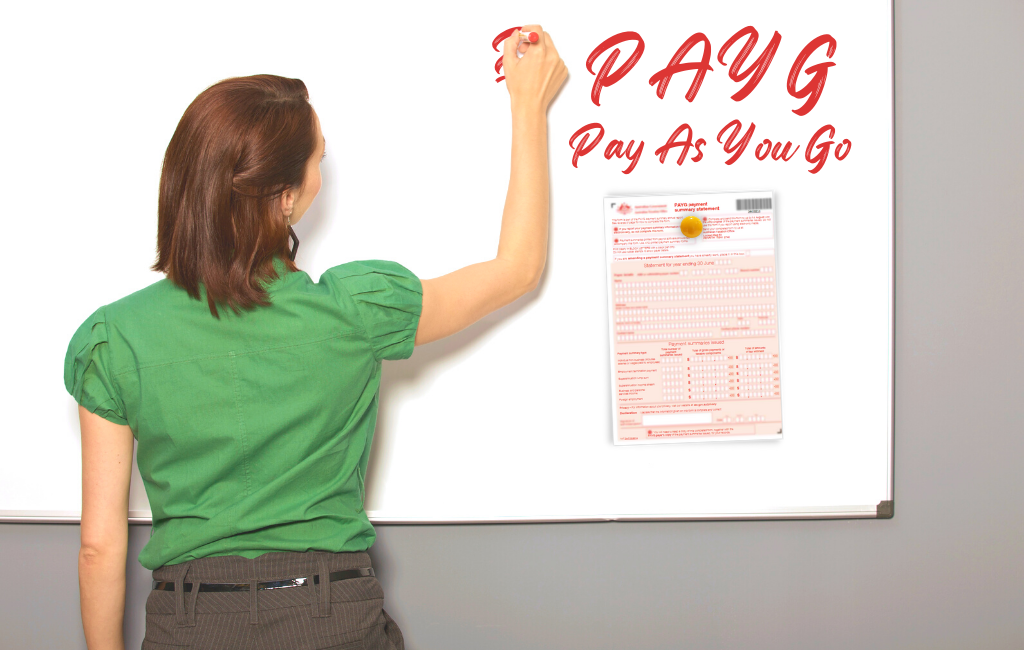Categories
The Inís and Outís of PAYG

We have many clients asking us, what is PAYG, why do I need to pay the ATO upfront and how does it affect a business? There’s no need to struggle to understand this system anymore, let’s break it down!
So simply put, ‘PAYG’ is short for ‘Pay As You Go’. The PAYG payment instalment system allows you and your business to meet your income tax obligations by making smaller quarterly payments to the ATO during the financial year which go towards an expected tax bill on business and investment income… no one wants to be hit with a massive tax bill at the end of the year, right!
How it’s calculated
Your total tax liability is calculated at the end of the financial year when the annual income tax return is assessed. The PAYG instalments which you pay throughout the year are credited against the assessment total to determine whether you are required to pay additional tax, or if you have a refund owed to you.
Those who have to pay PAYG instalments will be contacted by the ATO, who advise what your instalment rate will be. This is determined according to data in the last assessed income tax return.
The ATO will ask a taxpayer to enter the PAYG payment system when their business or investment income exceeds a certain threshold – see below.
The PAYG instalments may be included as part of your activity statement, or the ATO may issue a separate instalment notice.
The general method used to calculate the instalment is the instalment rate multiplied by business and investment revenue for the instalment period. The key benefit of using this method is that instalments are based on income as you receive it, rather than an estimate based on the previous tax situation. Certain entities, as well as all individuals, can choose to pay the instalment amount calculated by ATO which has been based on the latest income tax assessment including an uplift estimate. You need to make your decision on the method you choose to go with prior to the due date for the first instalment for each financial year, and then it will apply for the rest of that year.
You may vary your instalment if you believe the instalment rate, or the instalment which was calculated by the ATO, could potentially result in you paying more or less than the expected tax liability for the year.
Individuals
If you are an individual (including a sole trader) or trust, you will automatically enter the PAYG instalments system if you have all of the following:
- business or investment income from your latest tax return of $4,000 or more, and
- tax payable on your latest notice of assessment of $1,000 or more.
PAYG instalments for individuals are typically paid each quarter. If business and investment income has less than $8,000 owing on an individual’s most recent annual tax liability and certain other conditions are met, an annual instalment can be set up for payment. If an individual is a primary producer or has a specialised profession, such as sportsperson, artist, inventor or author, a special two instalment option may be available.
Partnerships and Trusts
Usually, partnerships and trusts don’t need to pay PAYG instalments. However, special rules apply to partners and beneficiaries when calculating their own PAYG instalments.
Companies
Corporate tax entities with annual turnover above $2m or with an estimated tax liability of over $500 are required to pay PAYG instalments. This is most commonly quarterly together with the BAS however; it could be monthly if certain criteria are met. Companies may choose to pay an annual instalment if they meet the criteria that apply to individuals noted above, plus some additional conditions.
Superannuation Funds
Superannuation funds generally pay their PAYG instalments quarterly. Superannuation funds can choose to pay an annual instalment if they meet the same conditions that apply to individuals noted above.
If you would like to discuss any of the above information with our team, please don’t hesitate to contact our office on: (03) 8393 1000.
